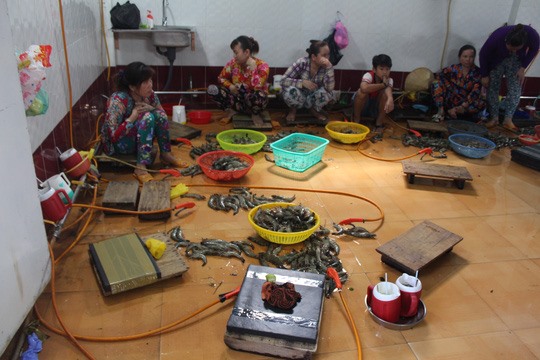 Society
Society

The Ministry of Agriculture and Rural Development has co-operated with police to combat the illegal injection of gel into shrimps to increase their weight and thus make more money.
 |
| The Ministry of Agriculture and Rural Development has co-operated with police to combat the illegal injection of gel into shrimps to increase their weight and thus make more money. — Photo nhathuocthuy.vn |
BẠC LIÊU – The Ministry of Agriculture and Rural Development has co-operated with police to combat the illegal injection of gel into shrimps to increase their weight and thus make more money.
Phạm Tiến Dũng, chief inspector of the ministry’s specialized inspection unit, said the National Agro-Forestry-Fisheries Quality Assurance Department had found many cases of gel injections into shrimps in the past several months.
On September 7, an inspection team in the southern province of Bạc Liêu found that a local shrimp trading business injected a liquid made of CMC (Carboxymethyl cellulose) powder. The business, owned by Đoàn Văn Phục of Đông Hải District’s Long Điền Commune, hired workers to inject the liquid into more than 63 kilogrammes of shrimps. More than 9 kilogrammes of CMC and tools such as needles were seized.
The white powder named CMC becomes a liquid when mixed with water.
The National Agro-Forestry-Fisheries Quality Assurance Department reported surprise inspections at 11 shrimp trading businesses in the southern provinces of Cà Mau and Kiên Giang had found three that injected the substance into shrimp. The businesses were fined VNĐ200 million ($8,800), each.
Early last month, a business in Hà Nội’s Hoàng Mai District was found to inject the gel into 8 kilogrammes of shrimp. Lê Quang Long, the business owner, admitted the violation.
Since last year, the departments of agriculture and rural development have inspected more than 10,300 businesses and found that 1,107 conducted the gel injection into shrimp. They were fined up to VND2.4 billion ($105,600) in total.
Violators admitted that each gramme of CMC is sold at about VNĐ28,000 ($1.20). Three grammes of the powder can be made into 50 kilogrammes of liquid, which can be used for one tonne of shrimp.
Inspectors say businesses usually conduct such illegal activities at different times and deploy workers in different places to avoid attention. They have proposed that authorized agencies increase the fines and prosecute violators. – VNS




